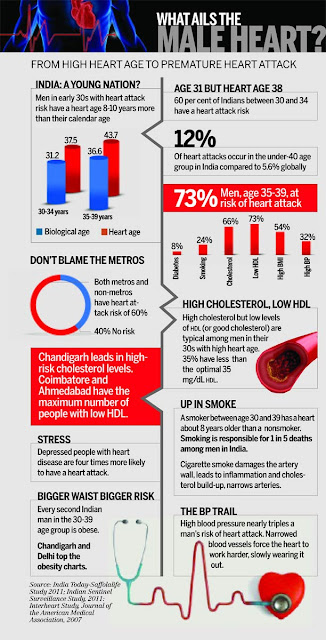Treatment after heart attack
Early treatment for a heart attack can prevent or limit damage to the heart muscle. Acting fast, at the first symptoms of a heart attack, can save your life.
Medical personnel can begin diagnosis and treatment even before you get to the hospital.
Certain treatments usually are started right away if a heart attack is suspected, even before the diagnosis is confirmed.
Certain treatments usually are started right away if a heart attack is suspected, even before the diagnosis is confirmed.
These include:
1. Oxygen therapy
2. Aspirin to thin your blood and prevent further blood clotting
3. Nitroglycerin to reduce your heart's workload and improve blood flow through the coronary arteries
4. Treatment for chest pain
Once the diagnosis of a heart attack is confirmed or strongly suspected, doctors start treatments to try to promptly restore blood flow to the heart.
The two main treatments are "clot-busting" medicines and angioplasty, a procedure used to open blocked coronary arteries.
Clot-Busting Medicines
Thrombolytic medicines, also called "clot busters," are used to dissolve blood clots that are blocking the coronary arteries.
To work best, these medicines must be given within several hours of the start of heart attack symptoms. Ideally, the medicine should be given as soon as possible.
Angioplasty
Angioplasty is a nonsurgical procedure that opens blocked or narrowed coronary arteries. This procedure also is called percutaneous (per-ku-TA-ne-us) coronary intervention, or PCI.
A thin, flexible tube with a balloon or other device on the end is threaded through a blood vessel to the narrowed or blocked coronary artery.
Once in place, the balloon is inflated to compress the plaque against the wall of the artery. This restores blood flow through the artery.
During the procedure, the doctor may put a small mesh tube called a stent in the artery. The stent helps prevent blockages in the artery in the months or years after angioplasty.
Other Treatments for Heart Attack
1. Medicines
Beta blockers.
Beta blockers decrease your heart's workload. These medicines also are used to relieve chest pain and discomfort and to help prevent repeat heart attacks. Beta blockers also are used to treat arrhythmias (irregular heartbeats).
ACE inhibitors.
ACE inhibitors lower blood pressure and reduce strain on your heart. They also help slow down further weakening of the heart muscle.
Anticoagulants.
Anticoagulants, or "blood thinners," prevent blood clots from forming in your arteries. These medicines also keep existing clots from getting larger.
Anticlotting medicines.
Anticlotting medicines stop platelets from clumping together and forming unwanted blood clots. Examples of anticlotting medicines include aspirin and clopidogrel.
You also may be given medicines to relieve pain and anxiety, treat arrhythmias (which often occur during a heart attack), or lower your cholesterol (these medicines are called statins).
You also may be given medicines to relieve pain and anxiety, treat arrhythmias (which often occur during a heart attack), or lower your cholesterol (these medicines are called statins).
2. Medical Procedures
Coronary artery bypass grafting (CABG) also may be used to treat a heart attack. During CABG, a surgeon removes a healthy artery or vein from your body. The artery or vein is then connected, or grafted, to the blocked coronary artery.
The grafted artery or vein bypasses (that is, goes around) the blocked portion of the coronary artery. This provides a new route for blood to flow to the heart muscle.



Comments
Post a Comment